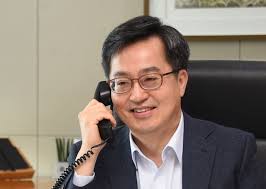Posted on : Apr.15,2018 08:00 KST
 |
|
Deputy Prime Minister and Minister of Strategy and Finance Kim Dong-yeon speaks during a phone call with US Treasury Secretary Steven Mnuchin on Apr. 12. (provided by Ministry of Strategy and Finance)
|
Deputy Prime Minister denies that the country meets the criteria for the US Treasury designation
 |
|
Deputy Prime Minister and Minister of Strategy and Finance Kim Dong-yeon speaks during a phone call with US Treasury Secretary Steven Mnuchin on Apr. 12. (provided by Ministry of Strategy and Finance)
|
The South Korean government is waging a last-minute campaign to avoid designation as a currency manipulator in an upcoming US exchange rate report. In a 15-minute telephone conversation with US Treasury Secretary Steven Mnuchin on the morning of Apr. 12, South Korean Deputy Prime Minister and Minister of Strategy and Finance Kim Dong-yeon stressed that Seoul would “remain unchanging in its principle of allowing exchange rates to be fundamentally decided by the market, while implementing market stabilization measures in the event of rapid rushes of funds and other sudden changes.”
Explaining South Korea’s trade balance and current account balance trends with the US last year, Kim stressed that it “does not meet the criteria for US designation as a currency manipulator.”
The US is scheduled to publish an exchange rate report around Apr. 15 for the first half of 2018. The report assigns currency manipulator status to countries that meet three criteria: a bilateral trade surplus of at least US$20 billion with the US, a material current account surplus of at least 3% of gross domestic product (GDP), and one-sided intervention in the foreign exchange market when net foreign currency purchases total at least 2% of the economy’s GDP. Last year, South Korea avoided currency manipulator designation by meeting only two of the three criteria, namely those concerning its trade and current account surpluses.
While stressing that the South Korean government had not deliberately intervened in the foreign exchange market, Kim also noted the trend of decline in the trade surplus with the US. According to US statistics, South Korea’s trade surplus with the US totaled US$28.3 billion in 2015, US$27.6 billion in 2016, and US$22.9 billion last year.
Based on South Korea’s own statistics, Kim noted, the surplus last year stood at US$18 billion, which falls short of the US$20 billion criterion for currency manipulator designation. The difference in calculations stems from the fact that export totals are based on the free on-board value for items loaded onto vessels, while import totals are based on prices including freight charge and insurance.
South Korea is also currently in discussions with the US on the disclosure of details concerning its foreign exchange market interventions. The Ministry of Strategy and Finance is considering an approach of disclosing net purchases on a half-yearly or quarterly basis rather than all purchases and sales, while the US is asking for monthly disclosures, sources said.
“According to the US Trade Facilitation and Trade Enforcement Act, South Korea meets only two of the three criteria [for currency manipulator designation],” Bank of Korea governor Lee Ju-yeol told reporters after a Monetary Policy Committee meeting that day.
“The possibility of designation is slight, but it is still too early to reach conclusions,” he added.
In response to concerns that disclosing foreign exchange market interventions could result in a stronger won, Lee said, “We’ve stuck to an approach of letting the market decide the exchange rate, so the discussions on disclosing foreign exchange market interventions should not function as an underlying factor in a strong won.”
By Heo Seung and Lee Soon-hyuk, staff reporters
Please direct questions or comments to [english@hani.co.kr]










